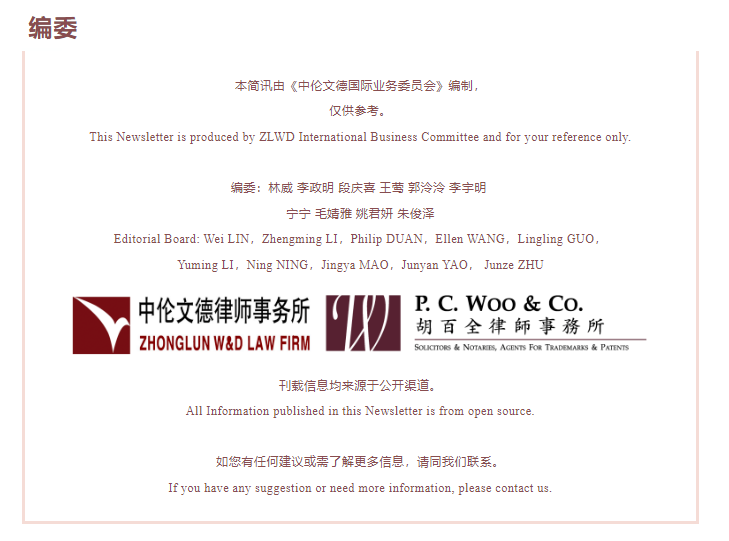
NEWS

NEWS

"Shanghai Arbitration Association Interim Arbitration Rules" Released
On September 9, 2024, the Supreme People's Court released the "Annual Report on Judicial Review of Commercial Arbitration by the Supreme People's Court (2023)" (hereinafter referred to as the "Annual Report").
In 2023, courts across the country concluded over 16,000 cases related to judicial review of commercial arbitration. Among these, more than 3,800 cases involved applications for the confirmation of the validity of arbitration agreements, over 10,800 cases were applications to revoke arbitration awards, and 75 cases involved applications for recognition and enforcement of foreign arbitration awards; there were over 1,700 cases concerning applications for non-enforcement of arbitration awards. Additionally, courts nationwide handled over 5,100 arbitration preservation cases.
This Annual Report is divided into three main parts. The first part focuses on new developments in judicial review of commercial arbitration in China in 2023, systematically showcasing new achievements, breakthroughs, and progress in various areas, including arbitration laws and regulations, the construction of international commercial arbitration centers, typical cases of judicial review of arbitration, the "one-stop" diversified resolution platform for international commercial disputes, and international exchanges. The second part provides an overview of national arbitration judicial review cases for 2023, presenting basic data on commercial arbitration cases and judicial review cases, along with characteristics and trends of these cases. The third part includes arbitration judicial review cases and adjudication rules, summarizing the review approaches and adjudication standards based on arbitration judicial review cases handled by the Supreme People's Court in 2023, along with selected cases from various high people's courts across the country.
Supreme People's Court Releases Typical Cases Supporting Hong Kong Arbitration
On September 5, 2024, the Supreme People's Court issued six typical cases supporting Hong Kong arbitration. These cases include applications for the confirmation of the validity of arbitration agreements involving Hong Kong, preservation cases assisting Hong Kong arbitration, and applications for the recognition and enforcement of Hong Kong arbitration awards. They vividly demonstrate the judiciary's stance of supporting Hong Kong arbitration and promoting high-quality development of international arbitration.
First, efficient preservation assistance ensures the smooth progress of Hong Kong arbitration. Arbitration preservation plays a crucial role in safeguarding the arbitration process and the eventual enforcement of arbitration awards.
Second, the court supports and encourages parties to choose Hong Kong arbitration for dispute resolution. Arbitration agreements are the cornerstone of the arbitration system and a prerequisite for arbitration institutions to gain jurisdiction and initiate procedures.
Third, the court facilitates the cross-border enforcement of Hong Kong arbitration awards. The People's Court recognizes and enforces Hong Kong arbitration awards fairly and efficiently based on the Supreme People's Court's "Arrangements for Mutual Enforcement of Arbitration Awards between the Mainland and the Hong Kong Special Administrative Region" (hereinafter referred to as the "Arrangement") and the "Supplementary Arrangement on Mutual Enforcement of Arbitration Awards between the Mainland and the Hong Kong Special Administrative Region" (hereinafter referred to as the "Supplementary Arrangement"), effectively promoting Hong Kong's role as an international legal and dispute resolution service center in the Asia-Pacific region.
2024 China Arbitration Summit and China-Middle East North Africa Arbitration
Summit Successfully Held in Beijing
On September 26, 2024, the 2024 China Arbitration Summit and the China-Middle East North Africa Arbitration Summit were successfully held in Beijing. The forum was jointly organized by the China International Economic and Trade Arbitration Commission (CIETAC), the United Nations Commission on International Trade Law (UNCITRAL), the International Federation of Commercial Arbitration Institutions (IFCAI), and the All China Lawyers Association (ACLA).
In response to the demands of the times and to embrace new opportunities and challenges in the changing landscape of international arbitration, as well as to promote the development of international arbitration cooperation, CIETAC actively advocated for collaboration among 29 influential regional international arbitration institutions, including the Cairo Regional Centre for International Commercial Arbitration, the Saudi Commercial Arbitration Centre, the Dubai International Arbitration Centre, the African Arbitration Association, and the Libyan International Commercial Arbitration Centre. Together, they issued the "2024 Initiative for International Arbitration Cooperation" (hereinafter referred to as the "Initiative"), achieving broad consensus on enhancing communication, expanding cooperation, and advancing the high-quality development of international arbitration.
The Initiative emphasizes that international arbitration is an irreplaceable mechanism for resolving cross-border commercial disputes. To deepen international arbitration cooperation, it calls for a steadfast commitment to fairness and justice, ensuring transparency and independence in arbitration; enhancing cultural exchange in arbitration while advocating for open and win-win cooperation; actively seeking judicial support to strengthen the enforcement of awards across borders; collaboratively leveraging technological innovation to achieve green arbitration; uniting efforts to improve arbitration service levels; and working together to cultivate talent, solidifying the foundation for future development.
This forum provided a high-level platform for the arbitration community, both domestic and international, to discuss strategies for the development of international arbitration and to deliberate on major plans for international arbitration cooperation. Participants reached broad consensus on promoting international arbitration exchange and cooperation, achieving practical results that are of significant importance for deepening regional legal cooperation in arbitration, advancing the development of international arbitration, and maintaining global economic and trade order.
Shanghai Financial Court:
Claims of Invalidity of Arbitration Clauses as Standard Terms Due to Lack of Reasonable Notification Obligations Do Not Align with the Invalidity Conditions Specified in the Arbitration Law
Legal Basis:
"Arbitration Law of the People’s Republic of China"
Article 17
An arbitration agreement shall be deemed invalid in any of the following circumstances:
(1) items provided for arbitration exceed the legally regulated scope of arbitration;
(2) the arbitration agreement has been concluded by persons without civil capacity or with limited civil capacity;
(3) one party has forced conclusion of the arbitration agreement through coercive means.
Case Description:
On May 19, 2023, a company signed a "Maximum Guarantee Contract" (hereinafter referred to as the "Contract") with the Hualin Branch of a certain bank, numbered XXXX (High Guarantee) 2019001-16. Article 12.2 of the Contract stipulates, "Disputes arising from the performance of this Contract between Party A and Party B shall be resolved through negotiation; if negotiation fails, both parties choose to resolve the dispute by applying for arbitration to a certain committee." Article 14.3 states, "If arbitration is submitted, both parties agree to use the simplified procedure for hearing, and relevant legal documents (including arbitration legal documents) shall be delivered by express mail to the domicile of the other party recorded in this Contract (if there is a change, written notice shall be given to the other party and the arbitration committee), which shall be deemed as delivery."
The company applied to the Shanghai Financial Court (hereinafter referred to as the "Court") for the invalidation of the arbitration agreement stipulated in Articles 12.2 and 14.3 of the Contract, arguing that these articles are standard contract terms. The company claimed that the Hualin Branch of the bank, by using standard terms to set the arbitration clause, failed to fulfill its obligation to provide clear notifications and warnings. Furthermore, the clause in Article 14.3, stating "If arbitration is submitted, both parties agree to use the simplified procedure," excluded the company’s right to choose the ordinary procedure and should therefore be legally confirmed as invalid.
The Hualin Branch of the bank argued that the Contract was voluntarily signed by both parties and reflected their true intentions, making it legal and valid. The arbitration clause did not exempt or limit the bank's liability, nor did it increase the company's liability or exclude its main rights. Moreover, the arbitration clause was clear and specific, leaving no room for misunderstanding, and the bank had provided ample notification and explanation. The jurisdiction of the disputes to be handled by a specific committee did not violate laws or administrative regulations and was thus legal and valid.
Court's View:
First, the Court recognized that the Contract was voluntarily signed by both parties and reflected their true intentions, making its content legal and valid. According to Article 16 of the "Arbitration Law of the People's Republic of China," an arbitration agreement includes arbitration clauses established in contracts and agreements to request arbitration reached in written form before or after a dispute arises. In this case, the company and the bank's Hualin Branch signed the Contract, which included a clear expression of the intention to arbitrate, the arbitration matters, and the designated arbitration committee, thus making the arbitration clause legal and valid.
Second, the company's assertion that the arbitration clause is a standard term and that the Hualin Branch failed to fulfill its reasonable notification obligation does not meet the conditions for invalidity of arbitration agreements as specified in the "Arbitration Law of the People's Republic of China." Therefore, this claim lacks factual basis and legal grounds, and the Court does not accept it.
Finally, regarding the company’s claim that Article 14.3 of the arbitration clause excludes its right to choose the ordinary procedure, the Court stated that the arbitration clause represents an agreement on the dispute resolution method between both parties. Litigation and arbitration are two distinct mechanisms for dispute resolution, and the choice of arbitration is equally binding on both parties. Therefore, it cannot be considered an exclusion of a party's main rights. The arbitration clause does not exempt or limit the bank's liability, nor does it increase the company’s liability or exclude its main rights, so the Court does not support this claim.
In summary, the company’s reasons for asserting that Articles 12.2 and 14.3 of the Contract are invalid or unenforceable are not established, and the Court does not support these claims. Based on Article 20 of the "Arbitration Law of the People's Republic of China," the Court ruled to dismiss the company's application.
Ontario Court of Appeal: The Power to Set Aside an Arbitration Award on Grounds of Public Policy is
"Narrow and Exceptional"
Case Description:
William Richard Clayton, Douglas Clayton, Daniel Clayton, and Bilcone of Delaware Inc. (hereinafter referred to as "Clayton") planned to develop a quarry in Nova Scotia, which required approvals from both federal and provincial environment ministers. As part of the approval process, a Joint Review Panel (JRP) conducted an environmental assessment. The JRP concluded that the project would result in significant and irreversible changes, adversely impacting core community values, and recommended that the project be denied approval. Subsequently, both the federal and provincial environment ministers refused to approve the project.
Clayton initiated arbitration proceedings under the North American Free Trade Agreement (NAFTA). In the first phase of arbitration, the tribunal found that Canada violated its obligations under NAFTA Articles 1102 and 1105 due to a flawed environmental assessment. The Federal Court of Canada dismissed Canada's application to set aside that decision. In the second phase of arbitration, Clayton sought damages for the breach of NAFTA, claiming they would have earned $440 million in profits over 50 years had the project been approved. However, the tribunal concluded that Clayton failed to demonstrate a causal link between the NAFTA breach and the damages claimed. Ultimately, the tribunal awarded Clayton only $7 million for the loss of a fair and non-arbitrary environmental assessment opportunity.
Clayton applied to the Ontario Superior Court to set aside the damages award under Section 34 of the Federal Arbitration Act, arguing that the tribunal had incorrectly applied the burden of proof under international law, exceeded its jurisdiction, and issued a decision contrary to Canadian public policy. On November 24, 2022, the Ontario Superior Court dismissed the application, finding no genuine issue of jurisdiction and insufficient public policy concerns. Clayton subsequently appealed to the Ontario Court of Appeal (hereinafter referred to as the "Court").
Clayton raised two main issues: first, that the tribunal failed to apply the "balance of probabilities" standard required by international law when determining causation, instead adopting a higher standard akin to "beyond a reasonable doubt," thereby exceeding its jurisdiction. Second, Clayton contended that the tribunal's decision conflicted with Canadian public policy because it failed to act fairly, disregarded Clayton's expert evidence.
Court's View:
The Court noted that the tribunal explicitly identified and cited the "balance of probabilities" standard required by international law and did not adopt the higher standard asserted by Clayton. Therefore, the tribunal correctly applied the legal standard within its jurisdiction. The Court explained that Clayton's argument essentially attempted to transform a legal error into a jurisdictional issue. However, the Court emphasized that a legal error made by the tribunal within its jurisdiction does not equate to exceeding that jurisdiction. Only if the tribunal completely failed to apply the law or issued a ruling unrelated to the issues submitted for arbitration would it constitute a jurisdictional problem. The Court referenced previous cases to highlight that judicial intervention in arbitration awards is extremely limited, and the Court should not lightly intervene in decisions made by the tribunal within its jurisdiction unless there is a genuine issue of jurisdiction.
Regarding Clayton's second contention, the Court clarified the high standard for public policy, stating that an award is only deemed contrary to public policy if it seriously violates Canadian moral sensibilities and fundamental notions of justice. The Court cited past cases emphasizing that the scope of public policy is very narrow. It underscored that the power to set aside an arbitration award on public policy grounds is "narrow and exceptional" and should not serve as a backdoor for substantive review of the award. The Court made it clear that public policy is not intended to correct any errors that the tribunal may have made in its ruling but rather to prevent decisions that severely deviate from Canada’s fundamental notions of justice and morality. The Court concluded that there was no evidence indicating that the tribunal’s decision severely violated Canadian moral sensibilities. Clayton failed to demonstrate entitlement to the requested damages, having only proven the loss of a fair and non-arbitrary environmental assessment opportunity. The Court determined that this was precisely the content of the tribunal's award, and Clayton did not provide sufficient grounds for intervention.
In summary, the Ontario Court of Appeal ruled to dismiss the appeal.


